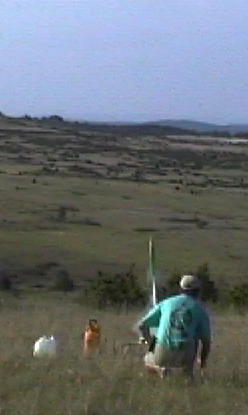Introduction
 Water
rockets have many advantages over pyrotechnic rockets, although their
performance is more limited.
Water
rockets have many advantages over pyrotechnic rockets, although their
performance is more limited.
The fact that they are not pyrotechnic removes the risks associated with
this technology (burns, fire) and the related legal constraints. In
France, pyrotechnic rocket launches must be carried out under the aegis
of CNES (the French NASA), which has delegated project control, the
organization of launch campaigns and club monitoring to Planète
Sciences.
Water rockets are therefore not subject to this regulation, but this
does not mean that this activity can take place anyhow, anywhere and
without a minimum of precautions as we will see in the chapter on safety.
On the other hand, water rocket launches can be done when desired
outside of the launch campaigns organized by Planète Sciences, which are
on well-determined dates and in limited numbers (May-June for minifusees
during the " Festiciels ”or generally in July or August for the national
campaign).
Another interest, the water rocket activity is very inexpensive. Most of
the matérials used can come
from recovery (plastic bottles of soft drinks, cardboard), moreover, the
necessary tools are rudimentary (ruler, cutter, scissors). This
authorizes the realization and the launching of numerous rockets,
therefore numerous experiments.
Unlike pyrotechnic rockets for which we have little control over the
propulsion (only the choice of engine is possible), the water rocket
allows you to play on many parameters (quantity of water, pressure,
nozzle diameter), which multiplies the possibilities for
experimentation.
Finally, and contrary to popular belief, we can also embark on
experiments. Of course, the altitude reached by a water rocket will be
lower, but in the altitude range of amateur rockets this is not really a
brake. Better still, the fact that the total impulse of a water rocket
being generally lower than that of a pyrotechnic rocket this forces the
designers to show a lot of ingenuity and thoroughness to make it lighter
while ensuring the resistance to accelerations much greater on a water
rocket than on a pyrotechnic.
In this site, we will first discuss the making and launching of a first
simple rocket, which will allow you to familiarize yourself with a good
part of the aspects of this activity. Then we will deepen the technique
of each of them.
In addition, there are many sites on water rockets, each more
interesting than the last. I'm not going to list them all here, but the
table below gives the few sites that I think are the most important and
why they appear to be so.
On the subject: Water rocket
In English
| Clifford Heath | his simulator is very well done and easy to use. It is the benchmark in the field. Thanks Clifford. |
| Dean Wheeler | Interesting video on the propulsion phase, a no less
interesting part on the theory and finally a simulator which
unfortunately no longer works, except to go back to an old
version of Java |
| Paul
Grosse |
Another very good quality simulator and lots of other informations |
| Air Command Water rockets | The most advanced water rockets with many explanations and vidéos |
In French
| Papyjo |
Lots of examples, lots of info. A must see |
| EricAbgrall | Blueprint of a simple rocket |
| Jean Pierre Laine | Very detailed descriptions of the manufacture of rockets and launcher |
| GoMars | Bernard's site who co-animated with me the Planet-Sciences training courses for "Water rocket" facilitators |
On the subject: Pyrotechnic rocket
| CLES FACIL | The club that I created in 1967 with some friends and to whom I owe this new passion. |
| Planete Sciences | The entity which federates and animates science clubs in France. |
| CNES | Rockets "for real" |
| NASA | ditto above, but at the American level. |


